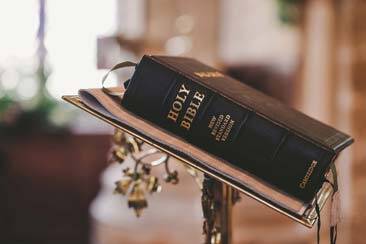Seventh-day Adventists believe that God’s law reflects His character of love (1 John 4:8; Romans 13:10). It is perfectly summarized in the Ten Commandments given to Moses on Mount Sinai, showing us the practical application of loving God and loving other people.
But while God’s commandments point out sin and show us our ideal, they cannot save us—only Jesus can.
This page will help you understand what the law entails and why it’s so important to Seventh-day Adventists.
You’ll find answers to questions like:
- Why is God’s law important to Adventists?
- Can keeping the law save us?
- Does keeping the law even matter anymore?
- What are the Ten Commandments founded on?
- How do we obey them?
- What about claims that the law was abolished?
We’ll start by looking at the official statement of the Seventh-day Adventist Church about the Ten Commandments. It reads:
“The great principles of God’s law are embodied in the Ten Commandments and exemplified in the life of Christ. They express God’s love, will, and purposes concerning human conduct and relationships and are binding upon all people in every age.
These precepts are the basis of God’s covenant with His people and the standard in God’s judgment. Through the agency of the Holy Spirit they point out sin and awaken a sense of need for a Savior. Salvation is all of grace and not of works, and its fruit is obedience to the Commandments.
This obedience develops Christian character and results in a sense of well-being. It is evidence of our love for the Lord and our concern for our fellow human beings. The obedience of faith demonstrates the power of Christ to transform lives, and therefore strengthens Christian witness.”
Because having a relationship with God matters to Adventists, His law and principles matter, too, because they show us how to relate to Him.
Let’s explore this idea a bit more.
Why is God’s law so important to Adventists?

Photo by Fares Hamouche on Unsplash
The law is crucial in Adventism because it reveals God’s character of love and shows how that love looks in action. Because we were created in God’s image to reflect His character (Genesis 1:27), the law shows us how we can live the way we were created to.
At the same time, it helps us see the reality of sin when we violate the boundaries of love.
It’s like taking your car to a shop and having the mechanic hook up the diagnostics tool. You’ll get a list of anything that isn’t performing as it should in order for you to safely operate your vehicle.
The list of diagnostic codes you’re given tells you where your car falls short.
But the list can’t save the car. And the car can’t fix itself. Only the mechanic can fix it.
Paul tells us in the New Testament that “by the law is the knowledge of sin” (Romans 3:20, NKJV).
In fact, without the law, there wouldn’t be sin. In defining sin, John says that “sin is the transgression [breaking] of the law” (1 John 3:4, NKJV).
But though the Law singles out an act as sinful, the Law itself is not sin.
“What shall we say then? Is the law sin? God forbid. Nay, I had not known sin, but by the law: for I had not known lust, except the law had said, thou shall not covet” (Romans 7:7; see also James 2:10–11, NKJV).
And it is because of sin—breaking God’s Law—that Christ died on the cross for us to take the penalty of breaking it (Romans 6:23).
“Christ died for our sins according to the Scriptures” (1 Corinthians 15:3, NKJV).
“For as by one man’s disobedience many were made sinners, so by the obedience of one shall many be made righteous. Moreover the law entered, that the offense might abound. But where sin abounded, grace did much more abound” (Romans 5:19–20, NKJV).
The word sin appears in various noun and verb forms in almost 700 verses and in almost every book of the Bible.
There are three different words for sin in the Old Testament:
- Hatta, which means to “fall short”
- Avon, which means to be “twisted, bent”
- Pesha, which means “rebellion”
These terms seem to cover the gist of sin, which is everywhere and in all times.
Quoting the Old Testament, the apostle Paul wrote how all humanity is under the spell of sin without any exception:
“There is none righteous, no, not one; there is none who understands; there is none who seeks after God. They have all turned aside; they have together become unprofitable; there is none who does good, no, not one…. Whose mouth is full of cursing and bitterness. Their feet are swift to shed blood; destruction and misery are in their ways; and the way of peace they have not known. There is no fear of God before their eyes” (Romans 3:10–18, NKJV).
Though written almost two thousand years ago, these words are certainly not outdated, are they?
Just consider the past century:
Mass murder and destruction have unfurled in ways never seen before despite all the hopes and promises of the Enlightenment. This movement promoted the idea that humans could overcome their evil natures and become good, honest, and moral beings through social structures and rational education.
But history has shown just how flawed that thinking is.
Humanity’s sinful condition has always found a way to showcase what it’s made of.
And for that reason, we need the commandments of God to show us where we have missed the mark of love and point us back to the one who can redeem us from our sinful condition.
Can keeping the law save us?

Photo by Georg Arthur Pflueger on Unsplash
The law of God, which points out sin, was never meant to save us from the problem of sin.
Primarily because the law condemns, not saves.
Think of yourself at a traffic intersection. A red light tells you how to act when you drive up to it. It tells you to stop.
But beyond telling you what step to take next, the traffic light doesn’t help you act the way you should. In fact, if you don’t act accordingly, it can be used to provide good evidence against you since you saw it.
It’s the same with the Ten Commandments.
They’re good in that they outline what loving behavior looks like (Romans 7:12). But if disregarded, they spell out your condemnation.
The problem escalates because we humans have a fallen, sinful nature bent on not following the law.
And that’s where the sacrifice of Christ comes in. We need the gift of God’s grace for the forgiveness of sin when we break the law.
As Paul puts it:
“If there had been a law given which could have given life, truly righteousness would have been by the law. But the Scripture has confined all under sin, that the promise by faith in Jesus Christ might be given to those who believe” (Galatians 3:21–22, NKJV).
If any law could have “given life,” it would have been God’s law—what else?
And yet Paul is saying that even God’s law can’t give life. It can’t make us righteous before God because we have all violated it.

Photo by Hugo Fergusson on Unsplash
But Jesus has taken our penalty on the cross. Through faith in Him—not through the Ten Commandments—we have the promise of forgiveness and eternal life.
“But God demonstrates His own love toward us, in that while we were still sinners, Christ died for us” (Romans 5:8, NKJV).
The reality of sin was the reason Jesus came, lived a perfect life, and died.
His perfect life and perfect record of law-keeping becomes credited to us—not because of what we do but because of what He has done:
“Knowing that a man is not justified by the works of the law, but by the faith of Jesus Christ” (Galatians 2:16, NKJV).1
Referring to Abraham as an example, Paul explains why salvation must be by faith and not by works:
“If Abraham was justified by works, he has something to boast about, but not before God. For what does the Scripture say? ‘Abraham believed God, and it was credited to him as righteousness.’ Now to the one who works, his wage is not credited as a favor, but as what is due. But to the one who does not work, but believes in Him who justifies the ungodly, his faith is credited as righteousness” (Romans 4:1–5, NASB).
We can’t work hard enough, do good enough, or even become good enough to earn eternal life in the first place. If we could, God would owe us eternal life because it would be a debt we have paid off.
But it’s because we can’t pay it off that Christ paid it off for us. That’s why salvation has to be by grace alone.
As the prophet Isaiah puts it, “Behold, God” —not the law—“is my salvation” (Isaiah 12:2, ESV).
Does keeping the law even matter anymore?

The fact that we’re not saved by the law doesn’t mean that keeping it no longer matters (Romans 3:31). After all, the law shows us what it means to love—to live our lives the way we were designed to flourish.
So why would we want to stay in the sinful life that holds us down and keeps us from experiencing true freedom and love?
As Paul puts it:
“What then? Shall we sin because we are not under law but under grace? Certainly not!” (Romans 6:15, NKJV).
Let’s get back to the red light example for a second. Imagine saying, “Well, if the red light can’t help me stop running it, why not keep running it?”
But the red light is there to keep you from suffering the results of what could happen if you do run it.
And this could be anything from killing pedestrians to getting into a terrible collision with another car.
It’s the same thing with God’s law.
The violation of it is sin, and sin often brings terrible consequences.
A parent tells a child not to play in traffic to protect the child.
And God’s law is for our protection—just like the boundaries a parent sets for a child.
The law is there for our good and the good of others. When we live within its boundaries, we’ll be able to experience the life God intends for us.
What are the Ten Commandments founded on?
Bible scholars have long recognized two overarching themes in the Ten Commandments in Exodus 20 principles for a relationship with God and principles for relationships with others.
Love is the foundation of both (Romans 13:8–10).
Principles for a relationship with God
The first four commandments all have to do with a person’s relationship with God. They are:
1. “You shall have no other gods before Me.”
2. “You shall not make for yourself a carved image—any likeness of anything that is in heaven above, or that is in the earth beneath, or that is in the water under the earth; you shall not bow down to them nor serve them. For I, the Lord your God, am a jealous God, visiting the iniquity of the fathers upon the children to the third and fourth generations of those who hate Me, but showing mercy to thousands, to those who love Me and keep My commandments.”
3. “You shall not take the name of the Lord your God in vain, for the Lord will not hold him guiltless who takes His name in vain.”
4. “Remember the Sabbath day, to keep it holy. Six days you shall labor and do all your work, but the seventh day is the Sabbath of the Lord your God. In it you shall do no work: you, nor your son, nor your daughter, nor your male servant, nor your female servant, nor your cattle, nor your stranger who is within your gates. For in six days the Lord made the heavens and the earth, the sea, and all that is in them, and rested the seventh day. Therefore the Lord blessed the Sabbath day and hallowed it” (Exodus 20:3–11, NKJV).
In summary:
- The first commandment commands us to worship God alone.
- The second commandment guides how we’re to relate to God. We don’t need to make idols to worship Him.
- The third commandment teaches us to respect the name of God.
- The fourth commandment reminds us to spend time with our Creator on the special day He’s set aside for that purpose.
In a sense, these principles point us upward to our vertical relationship with God. They’re an expression of human love toward Him.
When asked what the most important commandment was, Jesus responded:
“And you shall love the Lord your God with all your heart, with all your soul, with all your mind, and with all your strength. This is the first commandment” (Mark 12:30, NKJV).
Principles for relationships with others
The last six commandments guide our horizontal relationships:
5. “Honor your father and your mother, that your days may be long upon the land which the Lord your God is giving you.”
6. “You shall not murder.”
7. “You shall not commit adultery.”
8. “You shall not steal.”
9. “You shall not bear false witness against your neighbor.”
10. “You shall not covet your neighbor’s house; you shall not covet your neighbor’s wife, nor his male servant, nor his female servant, nor his ox, nor his donkey, nor anything that is your neighbor’s” (Exodus 20:12–17, NKJV).
Again, let’s summarize each one:
- The fifth commandment tells us to honor our parents.
- The sixth commandment instructs us to value human life.
- The seventh commandment teaches us to respect human relationships.
- The eighth commandment guides us to recognize boundaries and personal property.
- The ninth commandment keeps us from spreading lies and rumors about each other.
- The tenth commandment teaches us to be content with what we have.
Imagine if everyone followed the principles here—honoring parents, not murdering, not committing adultery, not stealing, not lying, and not coveting what belongs to someone else.
We wouldn’t recognize our world!
A story has been told about two people who were debating.
One argued that morals and cultural values were relative and that just because something was wrong in one place didn’t mean it was wrong in another.
Finally, the other person responded: “Sir, some cultures teach people to love their neighbors. Others teach them to eat their neighbors. Which do you prefer?”
Which would you prefer—living in a culture where people obeyed the last six commandments or where they didn’t?
We probably all agree on that one.
After sharing the most important commandment of love to God, Jesus, without waiting to be asked, gave the second most important commandment:
“And the second, like it, is this: ‘You shall love your neighbor as yourself’” (Mark 12:31, NKJV).
Just as we wouldn’t want someone to violate those commandments while dealing with us, we should do the same for others.
This is the essence of God’s moral law.
No, we aren’t saved by keeping the Ten Commandments. But our lives, and the lives of others, would be so much better if people did keep them. And that’s why God lovingly instructs us to do just that.
Here’s how we can.
How do we obey the law of God?
Obeying the law of God is not something we do in our own strength. It is a cooperation between the Christian and God through the working of the Holy Spirit.
So God has His part, and we have ours.
Paul tells us that “it is God who works in you both to will and to do for His good pleasure” (Philippians 2:13, NKJV).
We find that balance explained in the book of James when he tells us to “submit to God, resist the devil and he will flee from you. Draw near to God and He will draw near to you. Cleanse your hands, you sinners; and purify your hearts, you double-minded” (James 4:7–8, NKJV).
The first steps of obedience are drawing near to God and submitting to Him. Then, He can work in us and give us the power we need.
So how do we draw near?
Two ways:
Reading and treasuring God’s Word
God’s Word brings us close to Him and teaches us His ways. The Psalmist said:
“Your Word I have hidden in my heart, that I might not sin against You” (Psalm 119:11, NKJV).
Spending time in prayer
We can reach out to God in prayer and tell Him all our struggles. We can claim His promises for strength to resist Satan’s temptations to sin.
Jesus Himself told His disciples:
“Watch and pray, lest you enter into temptation. The spirit indeed is willing, but the flesh is weak” (Matthew 26:41, NKJV).
What if we mess up and sin?
When we mess up, we may feel pained by what we’ve done, but we shouldn’t allow it to keep us down. Instead, it should lead us back to God, who can forgive and cleanse us. He doesn’t give up on us, and He understands where we’re coming from.
After all, we’re all human. And as we have seen, no one can claim to be free of sin.
The apostle John says:
“If we say that we have no sin, we deceive ourselves, and the truth is not in us.… If we say that we have not sinned, we make Him a liar, and His word is not in us” (1 John 1:8; 1 John 1:10, NKJV).
But he goes on with this encouragement:
“If we confess our sins, He is faithful and just to forgive us our sins and to cleanse us from all unrighteousness” (1 John 1:9, NKJV).
If we sin, we can run back to God, admit we failed, and confess with a desire to turn in a new direction.
We are assured of His forgiveness because He understands us and our weaknesses (Hebrews 4:15).
And so, “if anyone sins, we have an advocate with the Father, Jesus Christ the righteous” (1 John 2:1, NKJV).
What about claims that the law was abolished?

Photo by Sam Carter on Unsplash
It’s true, some have said that Jesus abolished the law. Or that the Ten Commandments were nailed to the cross, so we don’t need to keep them now.
To support these ideas, many people cite Colossians 2:14.
But if you look at this verse in its context, the ordinances it mentions are the sacrificial systems and rituals practiced in the Old Testament sanctuary—the ones fulfilled through the death of Jesus on the cross.
Jesus is often referred to as the Lamb of God because the sacrificial animals in the Old Testament pointed to His death for our sins (Leviticus 4–5; Hebrews 10:12).
Once He died as the ultimate sacrifice, the ordinances of the sanctuary service were no longer necessary.
And these ordinances are distinct from the Ten Commandments.
When it comes to the Ten Commandments, Jesus made it clear that He didn’t come to get rid of them:
“Do not think that I came to destroy the Law or the Prophets. I did not come to destroy but to fulfill” (Matthew 5:17, NKJV).
And He affirmed that nothing will change about them:
“For assuredly, I say to you, till heaven and earth pass away, one jot or one tittle will by no means pass from the law till all is fulfilled” (Matthew 5:18, NKJV).
He even warned anyone who may want to carelessly break the Ten Commandments. Or teach others that it’s okay to ignore them.
“Whoever therefore breaks one of the least of these commandments, and teaches men so, shall be called least in the kingdom of heaven; but whoever does and teaches them, he shall be called great in the kingdom of heaven” (Matthew 5:19, NKJV).
Because the Ten Commandments reflect who God is and provide guidelines for our relationships with Him and others, it makes sense that these principles would continue to be vital for us today.
God’s law shows us how to live the way we were designed to live.
Seventh-day Adventists don’t keep the Ten Commandments to be saved. We keep them because we have already accepted the gift of salvation and are allowing God to restore us by His love.
As we draw closer to Him, He shows us how we can live the life He created us for—a life of selfless love that reflects Him. This kind of obedience will lead to the greatest freedom and joy rather than bondage:
“For this is the love of God, that we keep His commandments. And His commandments are not burdensome” (1 John 5:3, NKJV).
Learn more about how to grow into this beautiful purpose God has for us.
Choose an Online Bible Study
Want to keep learning? Find out more about Jesus, humanity, the plan of salvation, and how God loves you enough to sacrifice everything, just to give you a chance to choose Him.
Sometimes it can be hard to know where to start, that’s why we offer free, user-friendly, online Bible study options you can do anytime, anywhere, and at your own pace.
This online Bible school will take you through the major themes of Scripture, breaking down the Bible’s complex concepts into bite-sized pieces, which can lead you toward the answers of life’s more challenging questions.
Related Articles
- See also Philippians 3:9, Romans 5:1, and Ephesians 2:8–9. [↵]
More Answers
What Adventists Believe about The Experience of Salvation?
The Seventh-day Adventist Church believes that salvation is a gift that anyone can receive through faith in Jesus Christ, the Son of God. When we accept His sacrificial death in our place, He saves us from the penalty and power of sin (or evil), which prevents us from experiencing true freedom.
What do Seventh-day Adventists Believe about the Life, Death, and Resurrection of Jesus?
Jesus Christ, a person who lived in first-century Palestine, is the foundation of the Adventist faith. This is because it’s only through the life, death, and resurrection of Jesus that any of us have hope of life beyond the toil, suffering, and death of this world.
What do Seventh-day Adventists Believe about The Great Controversy?
The “Great Controversy” is the phrase Seventh-day Adventists typically use to describe the cosmic spiritual conflict between the forces of good (God) and the forces of evil or sin (Satan/the devil).
What do Seventh-day Adventists Believe about Creation?
Seventh-day Adventists believe that God is the creator of our world. They come to this conclusion from the first book of the Bible—Genesis. The account there tells us that God took six literal days to form the earth and all it contains, including us humans.
What Do Seventh-day Adventists Believe about the Father?
Like most Protestant Christians, Seventh-day Adventists believe in God the Father as part of the Godhead. We call Him Father because of His role towards Jesus. Jesus Himself encouraged us to also call Him Father.
What do Seventh-day Adventists Believe about Sin and the Nature of Humanity?
Seventh-day Adventists believe that humanity was created perfect and that, at our very core, we crave this kind of perfection and unity with God. But unfortunately, the Bible teaches that we chose to be wise in our own eyes and disobey God, which led to a natural tendency to be sinful, evil, and selfish.
What Do Seventh-Day Adventists Believe about God the Holy Spirit?
Besides believing in the full divinity of God the Father and God the Son, Adventists also believe in the full divinity of God the Holy Spirit. This post will go over what the Bible says about the Holy Spirit. You’ll learn:
What Do Seventh-day Adventists Believe about God the Son?
Seventh-day Adventists believe that Jesus is fully God, being one of the members of the Trinity. And that He plays a central role in it as the Son of God.
What Seventh-day Adventists Believe about the Trinity
How can Father, Son, and Holy Spirit all be one God? Find out as you learn what the Bible has to say about the Trinity.
What Seventh-day Adventists Believe about the Bible
The Bible forms the foundation for all that Seventh-day Adventists believe and teach. It reveals God to us and is our final authority on all issues relating to morals, doctrine, salvation, and the very nature and purpose of life itself (Isaiah 8:20).
Didn’t find your answer? Ask us!
We understand your concern of having questions but not knowing who to ask—we’ve felt it ourselves. When you’re ready to learn more about Adventists, send us a question! We know a thing or two about Adventists.
















